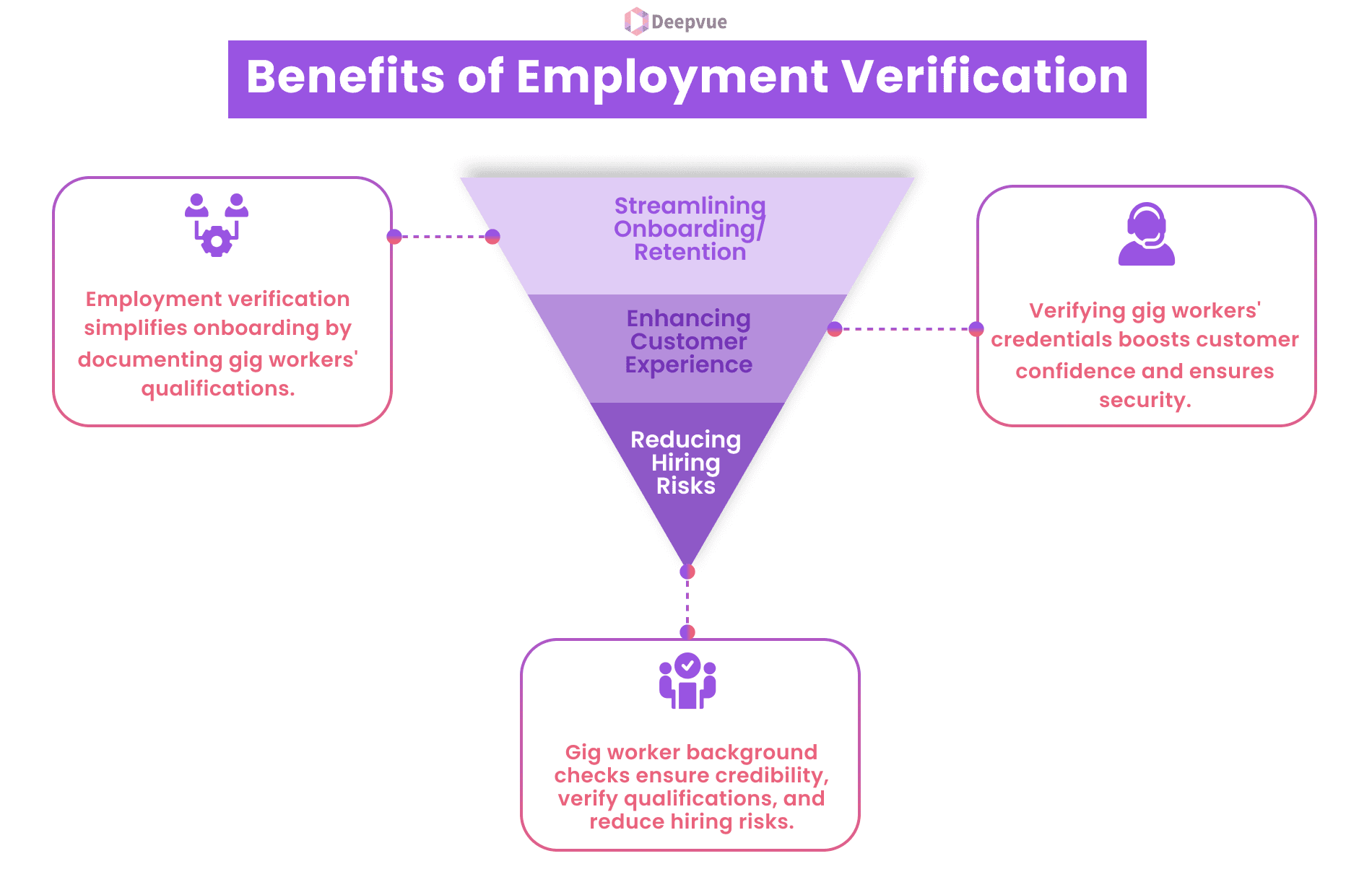The gig economy is the future—more people are opting for freelancing, ride-sharing, delivering, and gigging rather than being confined to a 9-to-5. It’s the era of flexible hours, hustle culture, and on-demand services. One could be a graphic designer by day, a delivery driver by night, and a writer on weekends. But while gig work gives so much flexibility and multiple sources of income, it throws up some big headaches, especially in proving you are actually “employed” at all!
After months, or even years, of hustling through various gigs, and filling your resume with projects and clients, you’re all set to apply for a loan or rent an apartment. That is when comes the question of “Do you have employment?” and when you’re not a regular employee or do not have pay stubs; proving stability and dependability becomes quite an ordeal. It’s at this point that employment verification comes into play.
In this blog, we’ll look at how employment verification can level the playing field for gig workers everywhere, helping them enjoy the same opportunities as traditional employees.
The Unique Challenges of the Gig Economy
- Absence of Face-to-Face Interaction: Most gig workers are remote and therefore impossible to gauge in behavior and reliability in person, not being among the full-time employees employed in a given office.
- Short-Term Contracts: Gig workers are primarily sourced based on short-term contracts. The nature of such an employment structure makes it difficult to evaluate businesses based on performance and fit into the organization.
- Diverse Skill Sets: Professionals with different types of skills are attracted to the gig economy, which is very beneficial. However, to ensure that the hired employee has the required qualifications and training, businesses need to perform careful vetting.
- Access to Sensitive Information: The roles and responsibilities of a gig worker may require them to manage sensitive data, financial information, or direct interactions with clients or customers. Therefore, it is essential to make sure that gig workers can be trusted with these kinds of responsibilities.
Why Background Checks Matter?
Here are several reasons why Gig economy worker background checks are critical:
- Qualification Verification: The background check plays a very significant role in verifying the authenticity of the work experience, educational qualifications, and certifications.
- Trust and Reliability: Gig economy worker background checks can help businesses avoid possible risks and assist in making informed decisions and avoiding people who would create threats to the company.
- Protection of sensitive information: In the case where the role and responsibility demand that gig workers access sensitive and financial information, background checks are considered relevant to ensure that the employees can be trusted.
- Regulation Compliance: Businesses may be mandated by law to perform background checks on independent contractors and freelancers, depending on the sector and region.
- Building a Positive Work Environment: To create mutual trust and cooperation, the company should maintain a safe and motivating working atmosphere for both its clients and full-time employees.
Benefits of Employment Verification for Gig Economy Platforms and Employers

- Reducing Hiring Risks: Gig economy worker background checks offer platforms and employers insight into a worker’s background, skills, and experience, reducing the risks associated with hiring. Verification procedures may ensure that the platforms receive a more credible workforce since such workers qualify with the set qualifications and standards required.
- Enhancing Customer Experience: It further enhances the overall customer experience when platforms verify the credentials of their workers. The certainty of credentials and identities of the gig workers whom a customer is going to interact with will assure a sense of security and confidence.
- Streamlining Onboarding and Retention: Employment verification can also streamline the hiring process, allowing platforms to onboard new workers more quickly and efficiently. All gig workers verified are easier to onboard because the background, work history, and qualifications of the persons are already documented.
How Technology is Transforming Employment Verification for Gig Workers?
- Automated Verification Systems: The automated verification system verifies the work history, income, and job performance of the worker by checking digital records. Such a system is faster and more reliable than forms of traditional verification. Fast processes enable platforms to speed up the vetting process of their workforce.
- Real-Time Verification Tools: The real-time verification tools make use of the APIs so that employment information such as earnings history, identity, and working hours is accessed instantly. Institutional processes would not only fasten but also update the most up-to-date status of a worker’s employment.
Implementing Effective Background Screening Processes
The following is best practice that businesses should consider when conducting a background check on gig workers:

- Use Background Screening Companies: Work with some of the most credible background screening companies to ensure a comprehensive and accurate check. It is essential to verify that the service provider follows all applicable laws and industry standards.
- Be Clear in Your Communication with Candidates: Be open and truthful with gig workers when discussing the background check procedures. It is important to get their consent and explain to them what will be looked at before starting the screening.
- Analyze and Interpret Results Carefully: After you get the results of the background check, give this sufficient thought and make an informed and reasonable employment decision. With suitable regard for the position and credentials of the applicant, you take notice of signs that could potentially indicate a red flag or a more serious issue.
No More Guesswork: Verified, Vetted, Victorious
Employment verification is not at the top of the excitement list in the gig economy, but for the gig worker and the platform, it’s a real game-changer! Verification lets gig workers show off their skills and steady income for short-term or long-term loans, rentals, new roles, and much more. For platforms and employers, this brings assurance of working with a vetted, trusted, and ready workforce to tackle work.
Our Identity Verification API catalyzes trust with fast verification of the identity of users, accelerates user onboarding processes, and reduces fraud risks. It ensures compliance with ever-changing regulations, scales easily as businesses grow, and provides high security. Business growth is scalable, while security is achieved. Businesses can enjoy peace of mind by securing and efficiently onboarding customers while creating the perfect first impression to have users return.
FAQ:
How does employment verification benefit gig workers financially?
For gig employees, having verified employment records can even make it easier to get loans and credit cards or sign rental agreements since that provides financial institutions proof of income and stability in employment, which will be harder to prove within gig roles.
Can gig economy platforms benefit from employment verification too?
Absolutely! It reduces the risks of hiring, builds trust with the customers, and makes it easier to onboard since it allows the platforms to vet workers promptly and have a more reliable and quality workforce.
What challenges do gig workers face without employment verification?
Without verification, gig workers may not access financial products, get proven skills, or prove income and, therefore, find tough challenges in financial stability, renting property, or new job opportunities.
How does technology simplify employment verification for gig workers?
With automation, real-time APIs, and even blockchain, employment verification has become faster, more accurate, and more accessible. This allows the gig worker to verify a history and income at a moment’s notice when needed.
How can employment verification shape the future of the gig economy?
As the gig economy grows, verification systems help legitimize gig work, offering greater security, financial access, and career opportunities, ultimately supporting a more stable and trusted gig workforce for all.








